Most people who have served in the military would rate themselves as an above-average shot – you only have to witness the banter when the air rifles make an appearance at Members’ Weekend to know that – but top-level marksmanship requires something different from being on the ranges, says Lesley Stewart.
Lesley, a former Royal Military Police officer, is a Paralympic prospect in a number of shooting disciplines. She’s hopeful of selection for Tokyo 2020 – now scheduled to be held later this year – with success at the Paris Paralympics in 2024 being her long-term target. “I had to retrain my brain to learn how to shoot competitively,” she explains. “There’s an aggression to military shooting, but it’s the opposite in a competition. To succeed, it’s all about staying calm. You’ve got to relax, lower your heartbeat, keep your movements to a minimum, be smooth on the trigger, never snatch, adjust your sights…
“I love the challenge. It’s technical, and there’s a lot to take in. When you’re shooting outdoors you need to consider the weather, too. People look at shooters and think they’re just standing still, but there’s so much more to it than that. It’s physically demanding; you’ve got to be fit and strong because you have to hold a position and support a rifle, without moving, for an hour and 15 minutes.
Lesley, from Blairgowrie in Perthshire, Scotland puts her excellence in the event down to her determination.
“I take pride in improving,” she says. “I was full of pride at serving in the Army, and putting on a GB kit makes me feel the same.” Hearing Lesley’s full story, it’s clear she’s extremely driven. After joining the Army in 2000, and whilst enjoying her time in the RMP, her life changed forever on an annual combat fitness test.
“I pulled a muscle in my back during the eight-mile run. It ached straight away, but within a week I was getting severe pain in my left ankle. My foot began twisting and pointing to the right. None of the medics could understand it because I hadn’t hurt my leg at all.”
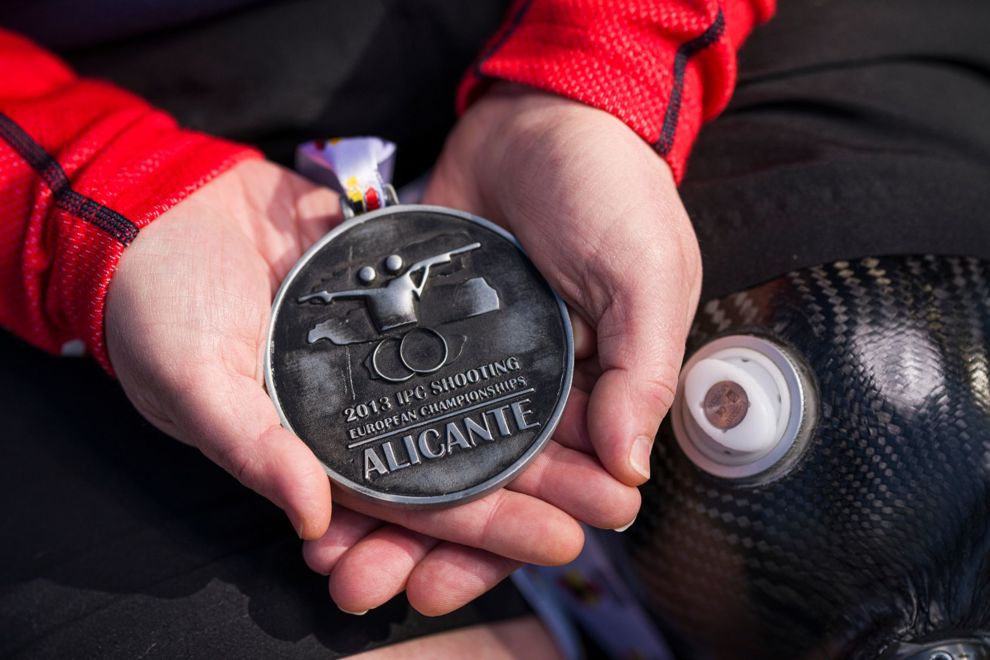
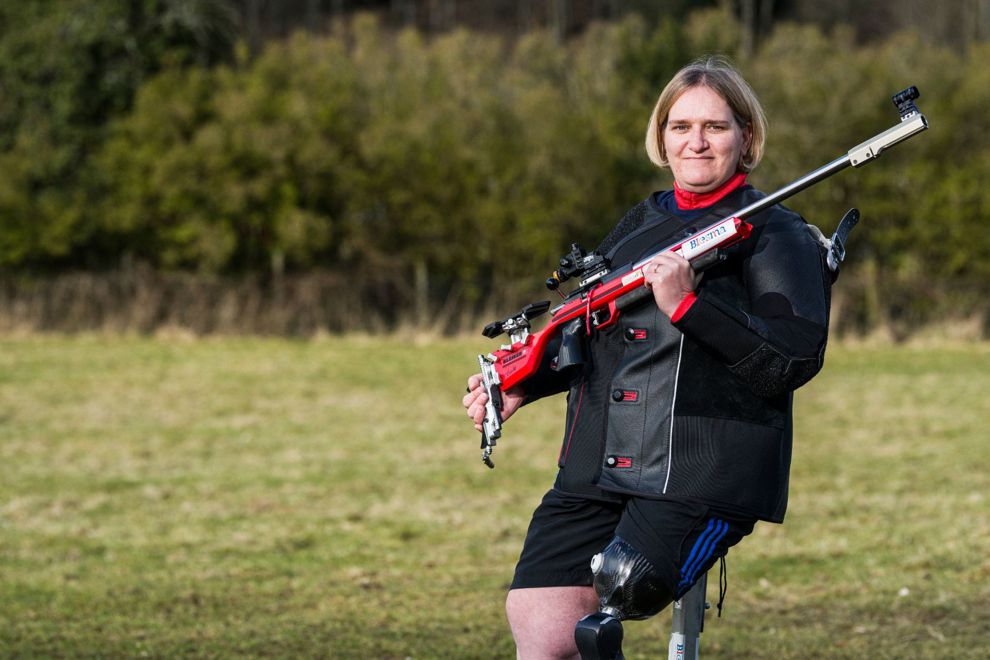
Diagnosed with Dystonia
Years of mystery would follow as Lesley underwent numerous scans and several operations in an attempt to straighten her foot, but not a single medical expert could explain why her ankle kept twisting sideways and upwards.
“I got moved to Headley Court and had further operations, but everything failed. I was in a huge amount of pain and was heavily medicated – so much so that I didn’t know where I was,” says Lesley.
“I’d phone my dad up to ask him to visit even though he’d just left me! Eventually, in 2007, I had a below-knee amputation because the leg was starting to die.”
But even this didn’t put an end to Lesley’s ordeal.
“After a couple of months of rehab, I started getting horrendous pain behind my knee. It was buckling backwards. I had more operations, but the doctors realised that they had to explore further. I was eventually diagnosed with something called dystonia."
“Basically, when I pulled that muscle in my back, my brain malfunctioned and started sending signals to my ankle instead of my back, telling it to go into spasm. After the amputation, the signal just moved to my next joint, which was my knee.
“My life was horrendous. I was screaming in pain constantly – you couldn’t have given me enough drugs! Eventually, I had to make a decision. I was told about a process called deep brain stimulation during which a box is implanted into your chest and wires are fused into your brain. The box would emit electric currents with the aim of blocking the pain signals to my knee.
“The operation is dangerous – I was told I might not wake up and that there was a high possibility that if the signal went to my spine or neck they could snap – but I was in so much pain that I decided to go for it.”
Rehabilitation and Rifles
Lesley underwent the procedure in September 2009. The operation meant she had to relearn how to speak and move around. “Thankfully, the operation was a success because after a couple of weeks, the knee released itself,” says Lesley. “I’d been in bed for years, so I had to retrain my whole body to walk. There was a lot of crying, but eventually the hard work paid off.”
During her rehab, meanwhile, Lesley was introduced to shooting. “The Shooting Association visited Headley to host a ‘have a go’ day. I did well and was invited to another weekend at Stoke Mandeville. While I was there, I was spotted by the performance director of the GB Paralympic team and soon after that I was training with them.”
Lesley was a natural. She won a silver medal at the 2013 European Championships in the 3P Para shooting category (competitors shoot in three positions – standing, kneeling and prone – over 50 metres). She also quickly excelled in the 50m prone shooting and 10m air rifle disciplines, both of which are Paralympic events, and a Team GB berth for Rio 2016 looked likely.
“Soon after that I was competing in Germany to try to get a qualifying score for Rio, when I got an infection in my stump,” she says. “I had an operation to clean it up, but over the next 14 months it kept reappearing. Eventually, the infection chewed through my stump. I had to have a conversation with my wife, Kirsty, about what to do next. Eventually, I made the decision to have an amputation above the knee.”
This ended Lesley’s Rio Paralympic dream; she had the amputation in 2017 and her hiatus from the sport lasted three years. But she has returned to shooting and – more determined than ever – has worked her way back into Paralympic contention.
“I’m now walking well on an above-knee prosthetic, and I’m shooting better than I ever have,” she says.
“I’m back up to National Academy level, just one rung below the World Class programme. Lockdown has slowed my progress, but if a couple of competitions go ahead and I shoot well, I can still get the right results to get into Team GB and go to Tokyo. My ultimate goal is Paris 2024, but in my mind, I’m planning for Japan.”
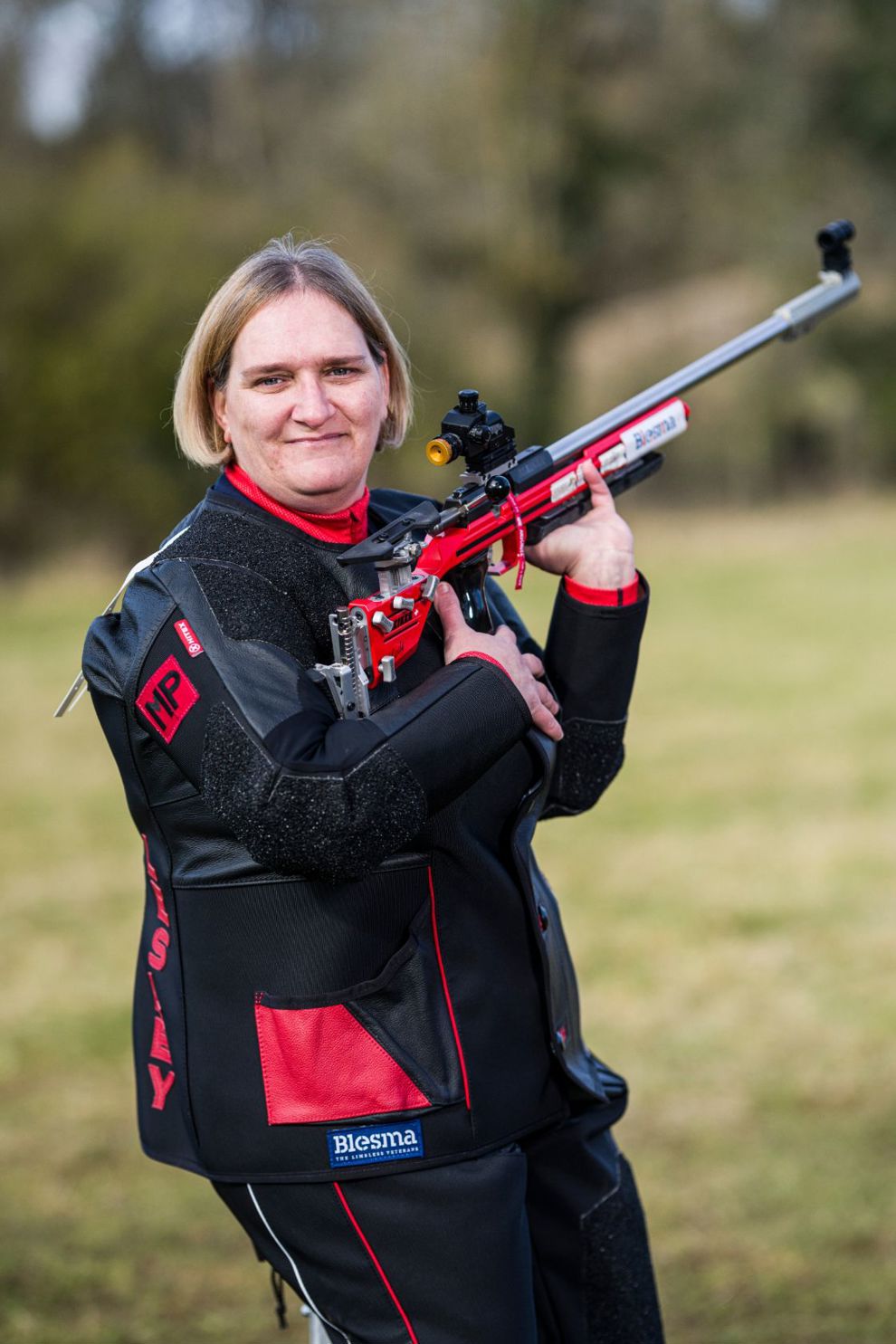
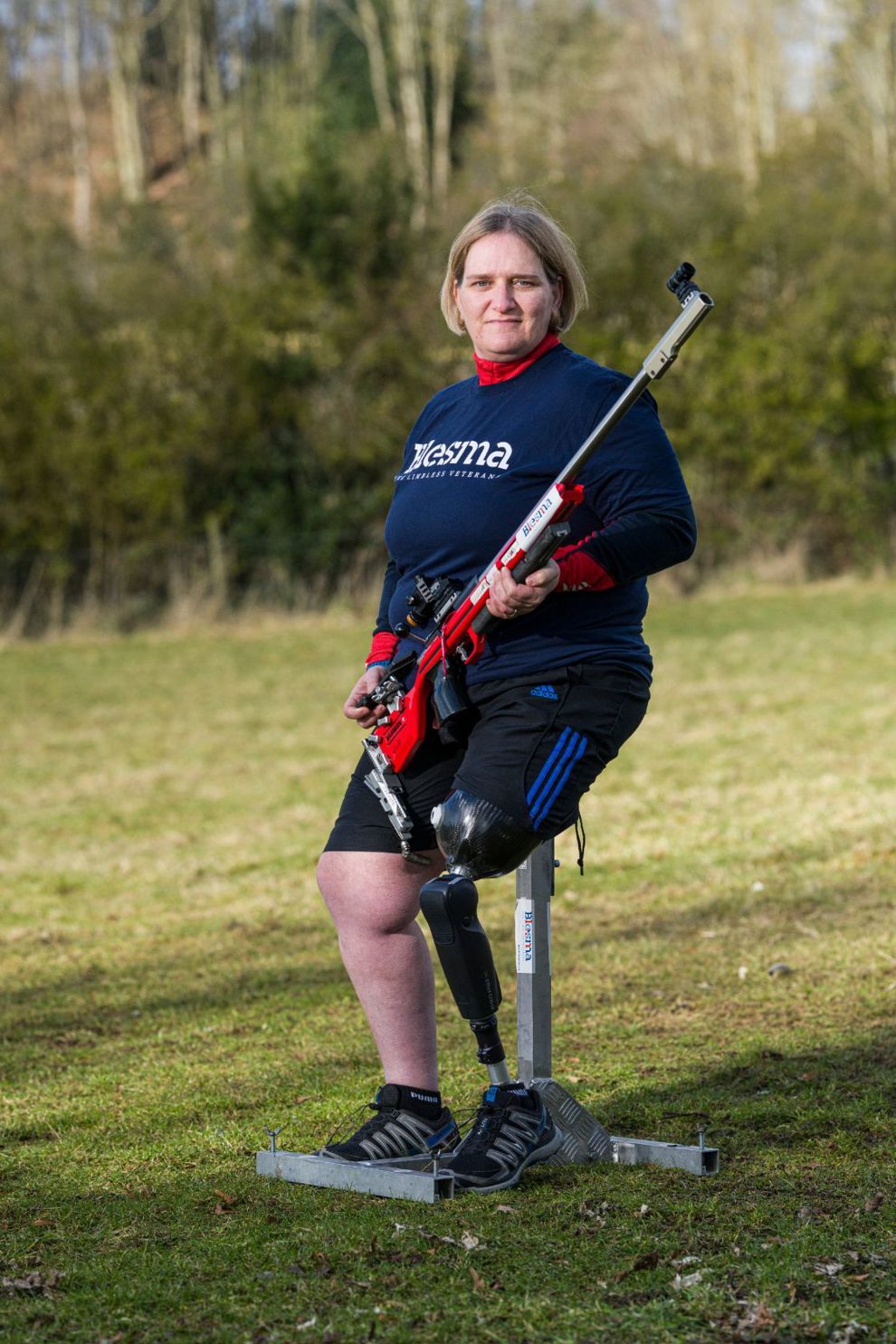
Support through Shooting
Every month, Lesley attends two shooting camps, each lasting five days, and she trains locally, too. She is full of praise for two communities that, she says, have supported her over the years; athletes and Blesma.
“Shooting is a small world and the athletes have been like another family to me,” she says. “Many people stayed in touch and supported me during my time out of the sport, for example, while my physio and conditioning coaches have really helped with my rehab from amputation.
“Blesma has also been great. My Support Officer, Steve Burton, is often in touch, and the Association assists me with funding. The charity has also been great during lockdown; I’ve enjoyed all the Zoom conversations, activities and presentations.”
Lesley remains keenly focused on the bullseye of Paralympic qualification. Yet however things turn out, she’s keeping her perspective, and is full of gratitude for her current happy state.
“If I got to Tokyo or Paris I would be so emotional,” she admits. “I’d be lost for words to put on that GB uniform again. After everything I’ve been through it would be such an achievement because I’ve busted my gut. I’d also feel pride for my family who have helped me so much but, at times, didn’t think I’d pull through.
“Life for me is really good now. I’m in great health and have a supportive family. Whenever I have a competition now I always look back on how I was doing a few years ago. No matter what I do in the future, to get to this point is a massive achievement."
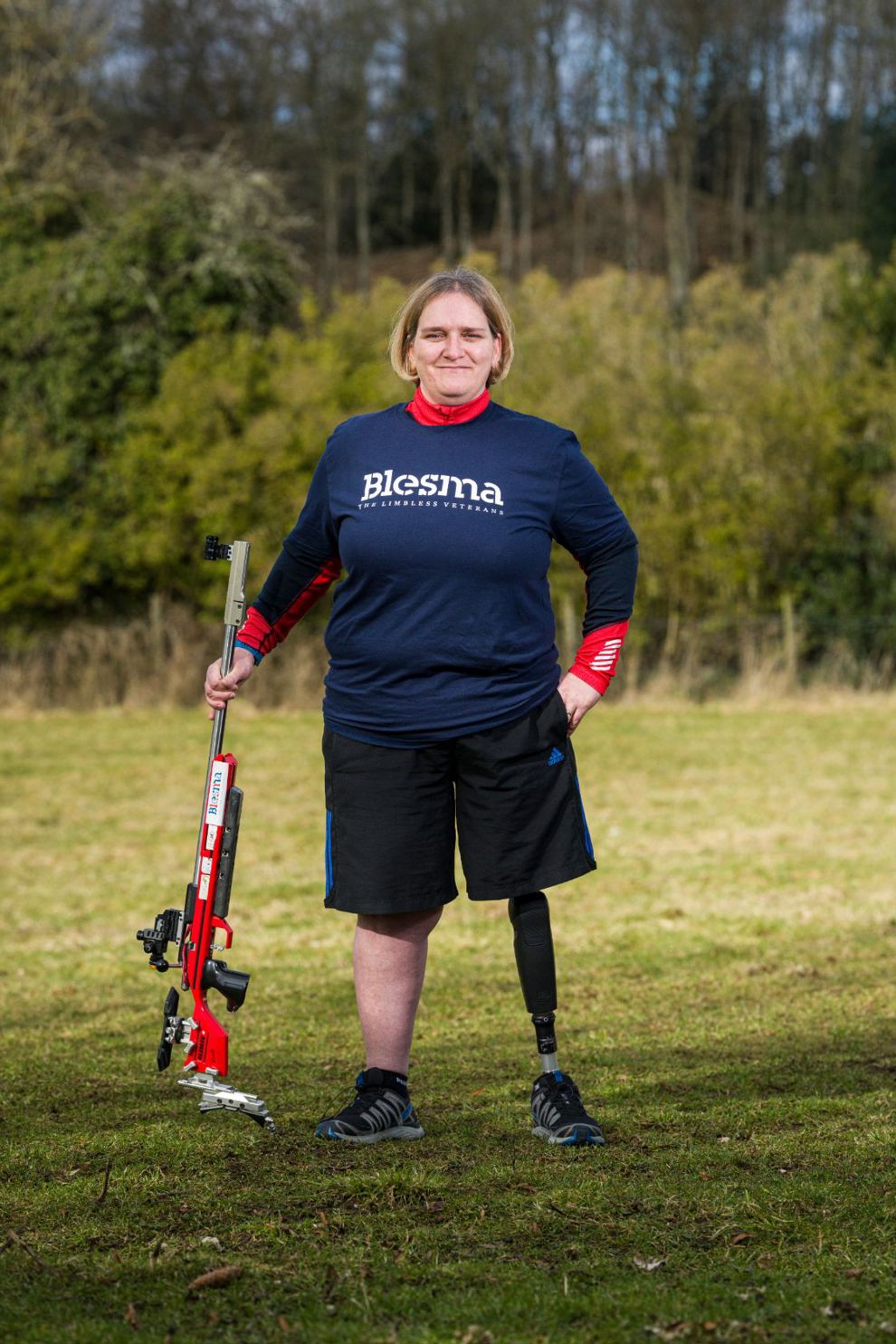
We can help
We are dedicated to assisting serving and ex-Service men and women who have suffered life-changing limb loss or the use of a limb, an eye or sight. We support these men and women in their communities throughout the UK. Click the link below to find out the different kinds of support we offer.
Get Support
Leave a comment
Join fellow Members and supporters to exchange information, advice and tips. Before commenting please read our terms of use for commenting on articles.